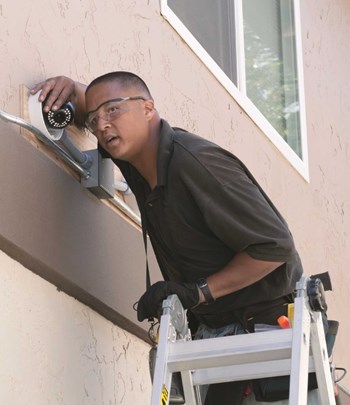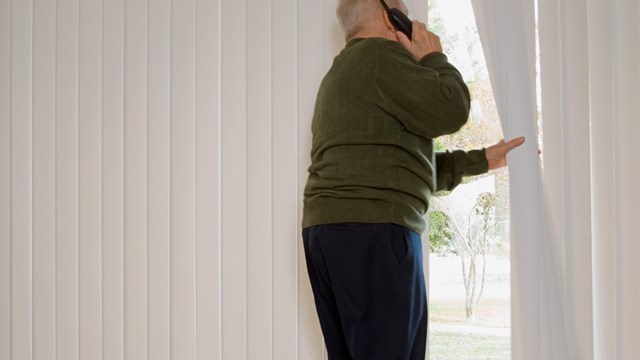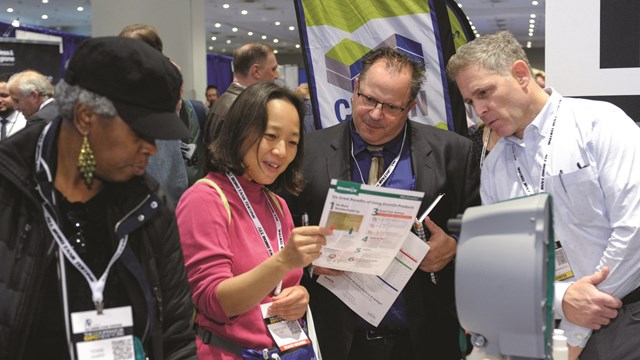
For most people, nothing is more important than knowing that they and their families are safe and secure in the place they call home. Boards, management and security firms all must work together seamlessly and cohesively to create that safe environment without making a building or community feel like a citadel. It can be a delicate balancing act, but with the right approach, it can be done.
Beginning the Process
In most cases, the board and manager will shoulder the burden of finding the right security firm with which to work. “Most times, it is a combination of the property manager, the board and the board president,” says John McGee of Cambridge Security Services with offices in Miami and Fort Lauderdale.
Larger communities may even have a security committee that can make recommendations for the board, adds Matthew Schwartz, regional vice president of ABM Security Services in Orlando. The security committee is beneficial in terms of reviewing and analyzing security issues for the community but ultimately the final vendor decision should be made by the board and property manager, he says.
Finding the right security partner can take time but it starts with research and talking with other board members, managers and staff. Schwartz suggests visiting other communities to get a feel of how the guards greet visitors and how other measures work in practice.
In addition to word-of-mouth and personal recommendations, researching through media and online information may also offer assistance in choosing a security firm.
Once the research has been done the next step is to construct a clear strategy for the search. Many professionals suggest that boards pursue a three-bid process. The multi-bid process helps to ensure that the search is completed in a cost-efficient manner. Additionally this process provides many benefits. Two of the key benefits are that the board receives competitive offers, but also as part of the negotiation process, the board will benefit from the information provided by the security companies who will be bidding for the contract.
A smart board will utilize comparison shopping, uniform requests for proposals that allow apples-to-apples comparison quantification, face-to-face meetings, and all methods of negotiation employed to ensure that they are receiving the best value for their dollars spent.
Competitive bidding is always the best way to find the security company that’s hungry, but the degree of quality security is always a concern. Asking the lowest bidder to come down on their price usually assures that the best deal is achieved but it’s never a good idea to beat up on a vendor since this can cause them to ‘cut corners.’ As always, you get what you pay for, so beware of the deal that sounds too good to be true.
Determining the Needs
Every building and community is different, meaning they all have disparate and unique security needs. The best way to determine an effective plan for safety is to do a thorough assessment of those needs. “The consultant will want to address the primary quality of life issues of the community. You need to prioritize those needs especially when you are trying to balance that with the financial aspect,” says Schwartz.
A consultant will generally look at the crime statistics and history of security-related problems as a first step. Additional items that will be surveyed are gates, fences, lighting, front entrances and parking, says McGee. An analysis of the history and landscape will aid the consultant in determining what existing security measures work and what needs to be improved upon, expanded or removed in order to provide the best possible plan.
When concerns and priorities are discovered, there is not just one way to address a safety or security problem. “A consultant will try to provide alternatives and choices for the community,” says Schwartz. For example, a security solution might be utilizing a security officer to patrol the area or installing cameras. The key is to give the board and residents options, especially when budget is a determining factor.
In addition, detailed conversations with board members, management and residents will help unearth any particular or ongoing issues. “A good consultant will go out in the neighborhood and talk to people door-to-door or send out surveys. In my opinion, you can't address the security needs of a community without getting to know the expectations and what the overall feeling is. You can have phenomenal security measures but if the community doesn't feel safe then you've got a problem,” explains Schwartz.
The needs of the community will also vary depending on the physical layout. A high-rise condominium in West Palm Beach will have different concerns than a gated HOA in Coral Springs. “A high or mid-rise has only a few access points and also has common areas that are very sensitive to all like electrical rooms, boilers, storage and parking garages. Security programs must address those key areas. Patrolling becomes very easy and it usually a "foot" patrol. A spread-out community has bigger perimeter creating access challenges as well as added costs if vehicle or golf cart patrols are necessary. In addition, technology driven security measures are more challenging with a spread-out community versus a high rise,” says Schwartz.
Building the Best Plan
As with anything, the key to successfully building a strong security plan is information and communication. The more information available to the security firm—not just from boards and management but from residents, shop owners and business owners—the better able a security firm will be able to establish a history and patterns for that area and build a plan that is unique to those needs.
It is also important to build a plan that is flexible, one that can be altered as problems are resolved or continue to grow. Many security companies will sign one-year contracts for guards or patrol but fail to assess the circumstances on a monthly or quarterly basis.
Clients and firms need to work as well to make sure they are focused on the real needs. For example, a building might not need a new surveillance camera; they might simply need to ensure that someone is watching the videos each day. Many consultants detail situations in which crimes had taken place or were suspected but no one had watched the surveillance footage. Other times, communities had an incident but no one recorded or reported it. Without that information and without an accurate, recorded history of past incidents, it can be difficult, if not impossible, to understand patterns and ultimately, understand the real needs of the building or association.
Dollars and Sense
Whether things are going well or there is room for improvement in the security arena, it is important to evaluate the relationship regularly. “My recommendation is that boards should be at least reviewing the program monthly. What are the statistics and what types of incidents are occurring? Is the contractor properly responding to those concerns? Contracts should be reviewed annually,” says Schwartz.
In some cases, neighboring communities may decide to offset security costs by sharing services.
“As it relates to sharing costs, the only time that works well is when communities cannot afford a full time patrol person. Having a shared patrol who can respond to issues as well as randomly patrolling each community may work in some cases,” says Schwartz.
McGee recommends that boards have their security measures and space evaluated every one to three years to address any concerns with what works and doesn't work, as well as make appropriate changes, to account for any environmental or structural changes that occurred in the community. Often security companies will provide these assessments free of charge.
While it may be tempting to go with the lowest cost vendor, McGee advises boards and managers not to make the decision simply based on price alone. “You get what you pay for. You'll want to do some investigation on the vendor and the measures. You want a competent, trained security officer not just a warm body sitting at your gate,” he says.
It’s no easy job keeping individuals and families feeling safe and secure, but with the right preparation, evaluation and execution of plans, it can be done efficiently and well. And that will help everyone sleep a lot easier each night.
Final Thoughts
If the board has a long-standing history with a security provider and there are not any price increases and service is meeting expectations, the board may want to periodically solicit proposals from a few competitors to serve as a benchmark. This will ensure that the board is still paying a competitive price.
Boards also might want to consider entering into multi-year contracts. Often, a company might be even more financially flexible. It is advised though that the contract should be re-evaluated at the end of the contract term to determine if pricing and service still meet the association’s expectations.
Keeping your building safe is a major responsibility as well as the board’s fiduciary duty. A good security company will work with the community to ensure that both parties are happy, safe and secure. And that peace of mind is well worth the cost of whichever security provider you choose.
Liz Lent is a freelance writer and a frequent contributor to The South Florida Cooperator. Editorial Assistant Maggie Puniewska contributed to this article.






Leave a Comment